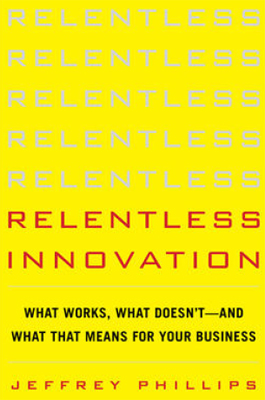Relentless Innovation

Relentless Innovation
In Relentless Innovation: What Works, What Doesn't - and What That Means for Your Business, expert innovation consultant Jeffrey Phillips posits that companies which fail to regularly exercise new ways of thinking about their products, services, problems and market share, put themselves on the path to obsolesce. Finding the perfect balance between an effective operating model and consistent focus on innovation is only possible but is vitally important.
Phillips identifies two key barriers to innovation - entrenched "business as usual" process which emphasise efficiency over innovation, and the middle managers who are charged with achieving quarterly financial goals. Relentless innovators demonstrate an "innovation business as usual" philosophy that achieves balance between efficiency and innovation. His book details specific steps that will enable any firm to become a Relentless Innovator.
Resorting the balance between innovation and efficiency, growing revenues and differentiation while achieving financial objectives and efficiently - this is the benefit of Relentless Innovation.
Jeffrey Phillips leads the innovation consulting team at OVO Innovation, a consulting and training firm working primarily with Fortune 500 firms. OVO Innovation partner with its clients to create a sustainable, repeatable innovation capability by training and building innovation teams, defining innovation processes, and developing open innovation partnerships. He is a well-known throught leader in the innovation space and regularly blogs and innovation.
Relentless Innovation
McGraw Hill
Author: Jeffrey Phillips
ISBN: 9780071786805
Price: $26.95
Interview with Jeffrey Phillips
Question: What inspired you to write Relentless Innovation?
Jeffrey Phillips: This is a funny, true story. I was working with a client, preparing to present ideas to a very senior executive for his approval. The executive liked the ideas very much, but said "the BAU won't let you do these". I wasn't familiar with the BAU - I thought that was a team or group within the organization. No, he said. The BAU is "business as usual". He meant the way the organization typically did things would be a barrier to new ideas. That made me think - what if all companies have a BAU that blocks innovation? Would that mean innovation is difficult for many firms? If so, how does any firm innovate?
Question: Who or what encouraged you to begin a career in business consulting?
Jeffrey Phillips: I started out in consulting, right out of college. I've always enjoyed solving problems, and in most regards good consultants are just serial problem solvers. I think many consultants are also people who want new experiences and new challenges, rather than working in the same industry or on the same problems day in and day out. That opportunity appeals to me.
Jeffrey Phillips: I think there are two big barriers to innovation, which I've simplified as "business as usual" and middle management. Business as usual is an umbrella term for all the formal and informal processes and decision making and corporate culture. As a firm grows and becomes successful, the BAU focuses on repeating the same success and loses some of its ability to explore, take risks and try new things. This is a vicious cycle, because the better a firm gets at what it does well, the less risk, change and innovation it is willing to endure. The reason I think middle managers are a contributor to this problem is that they bear the burden of using inputs and resources efficiently and of achieving short term goals. These responsibilities mean that middle managers focus on what the firm does exceptionally well, avoiding change, uncertainty, risk and innovation. Middle managers become, unintentionally, the guardians of BAU.
If a business could create a business as usual that balances efficiency and short term goals with innovation and long term opportunities which would be an unbeatable combination. Of course, middle managers would need to support both of those capabilities in order for it to succeed.
Question: How would you describe a relentless innovator?
Jeffrey Phillips: A Relentless Innovator is a firm that has achieved a balance between efficiency and innovation. Apple, Google, 3M and P&G are relatively efficient companies in their use of resources, people and time, but they are also very innovative, constantly generating valuable new products and services. These firms demonstrate that a balance between efficiency and innovation is possible, and that innovation can become a consistent business discipline. They are relentless in their pursuit of innovation.
MORE



